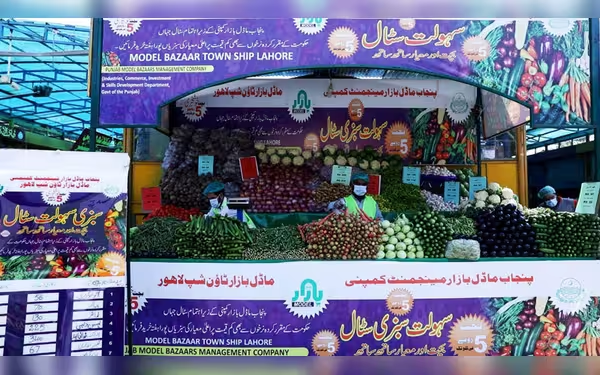Saturday, November 16, 2024 03:17 PM
Utility Stores Closure Sparks Model Bazaars Expansion in Punjab
- Utility stores face closure, prompting public protests.
- Model bazaars expand to 36 locations in Punjab.
- PMBMC focuses on sustainability and vendor support.
 Image Credits: dailytimes_pk
Image Credits: dailytimes_pkThe potential closure of utility stores in Pakistan leads to the expansion of model bazaars in Punjab, ensuring access to affordable goods.
The recent discussions surrounding the potential closure of utility stores across Pakistan have ignited significant public outcry. Many citizens rely on these stores for affordable essential goods, and the thought of losing them has led to widespread protests. In light of this backlash, the government has decided to postpone any plans for closure. However, the Punjab government is taking a different approach by expanding its model bazaars throughout the province.
Model bazaars are designed to create a friendly shopping environment where people can easily access essential items such as fruits, vegetables, and groceries. To enhance convenience, motorcycle delivery services have been introduced, allowing customers to receive their purchases directly at home. This initiative is part of a broader strategy to ensure that residents have access to affordable goods without the stress of long queues or high prices.
Naveed Rafaqat Ahmad, the chief executive officer of the Punjab Model Bazaars Management Company (PMBMC), has played a pivotal role in transforming the retail landscape since the company’s inception in 2016. Under his leadership, PMBMC has evolved into a self-sustaining project, aiming to operate independently from government funding. He stated, "My main goal was to create a sustainable business model that could operate independently from government funding." This vision has led to the expansion of model bazaars to 36 locations across Punjab, allowing the company to offer goods at prices lower than those set by the government.
One of the key strategies contributing to the success of PMBMC is the allocation of state land. The company has secured land from the government specifically for establishing these bazaars, which has been crucial in providing a physical space for both vendors and shoppers. Mr. Naveed emphasized, "I worked to facilitate the PMBMC with land transfer of the state without any associated costs, ensuring that the financial burden on the project remains minimal." This approach has enabled the bazaars to operate with lower overhead costs, enhancing their sustainability.
Operational efficiency is another cornerstone of PMBMC’s success. Mr. Naveed has focused on creating streamlined systems within the bazaars to optimize processes. This not only helps in better serving customers but also minimizes waste and improves service delivery. Additionally, he has prioritized revenue diversification by introducing various income sources, such as leasing land for attractions and food courts. These additional revenue streams bolster the financial stability of the company, allowing it to continue providing affordable goods without relying on government subsidies.
With an impressive annual customer turnover of 60 million, model bazaars have established themselves as trusted retail destinations in Punjab. However, the government’s involvement in retail has sparked debate among economists. Some, like Dr. Qais Aslam, argue that grocery stores should not fall under government responsibility. In response, Mr. Naveed clarified that PMBMC’s role is to support vendors rather than directly operate the bazaars. He stated, "We regulate the show, not run the show," emphasizing the importance of allowing vendors to thrive while benefiting customers.
The expansion of model bazaars in Punjab represents a proactive response to the challenges faced by utility stores. By focusing on sustainability, operational efficiency, and vendor support, PMBMC is not only providing affordable goods but also fostering a vibrant retail environment. As the situation evolves, it will be interesting to see how these initiatives impact the overall retail landscape in Pakistan and whether they can serve as a model for other provinces facing similar challenges.













